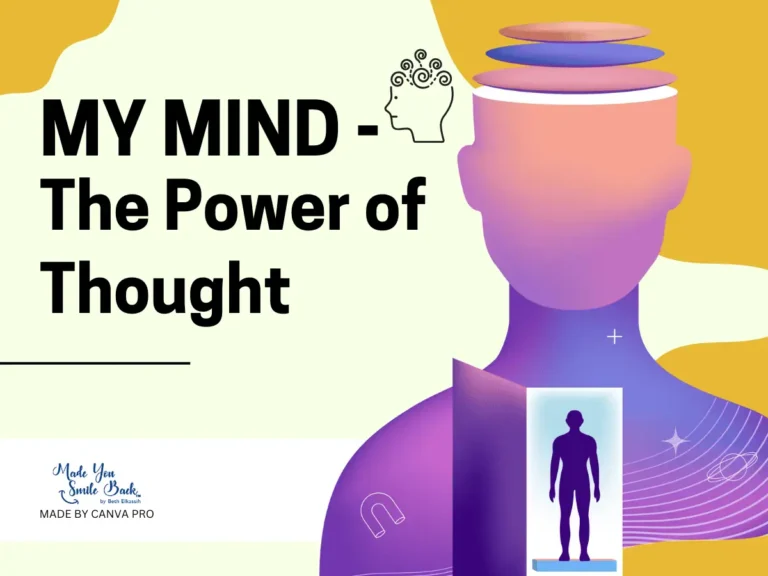🕒 Last Updated on May 30, 2025
My Mind: Understanding How Thoughts Shape Your Life
Your mind is more powerful than you might think—it’s the tool you use to learn, remember, and solve problems every day. Understanding how your mind works can help you organize your thoughts and boost your productivity at school, work, or home.
If you find it hard to keep track of ideas or remember important things, there are new tools designed to make this process easier.
For example, using digital platforms like mymind lets you save articles, images, notes, and bookmarks in one place, so you don’t have to worry about forgetting anything.
Taking care of your mind and giving it the right tools can help you focus, be creative, and stay organized.
When you use these strategies, you make room for new ideas and gain more control over your daily life.

Understanding My Mind
Your mind is complex. It holds your thoughts, your sense of self, and your memories.
What you notice, feel, and remember shapes how you see yourself and the world each day.
What Is the Mind?
Your mind is not the same as your brain, although they are connected.
Get your Freebie
The mind includes your thoughts, feelings, and beliefs. It’s where you process what you see and hear.
You decide, imagine, and remember in your mind.
Researchers often look at three ways to understand the mind: observation, reflection, and self-awareness (How to Understand Your Mind).
Observation means watching your thoughts. Reflection lets you think about why you feel a certain way. Self-awareness helps you notice your own patterns.
The mind makes you who you are.
How Consciousness Shapes Identity
Consciousness is what lets you know you exist. It’s your ability to notice what’s happening inside your head and all around.
When you pay attention to your own thoughts and actions, you are being conscious.
Your sense of self comes from your consciousness. This is how you remember your past, plan for the future, and even talk to yourself quietly in your head.
Your identity grows as you notice your feelings and how you react to different things.
The Role of Experience
Your experiences build your mind over time. Every interaction, memory, and new skill changes how you think and feel.
If you face a challenge, your mind adapts. If you form a new habit, learn something new, or make a friend, these experiences shape your beliefs and choices.
You may become less stressed, less anxious, or even happier by better understanding these experiences (10 Ways Understanding Your Mind Could Transform Your Life).
How you grow as a person depends on the lessons and memories your mind gathers.

Your thoughts play a big role in shaping your feelings, actions, and even your future choices.
The way you use language and the metaphors in your mind can change how you see problems, set goals, and handle daily life.
Words and Language in Mental Processes
Words are tools your mind uses to make sense of the world. The language you use shapes your thoughts and even how you feel.
For example, telling yourself “I can do this” can give you more confidence than saying “I’ll never succeed.”
Positive language can help you see possibilities where you thought there were none.
In many books on self-improvement, authors explain that the words you repeat to yourself become habits in your thinking.
This means that negative words can make problems look bigger, while positive words can help you find solutions.
Lists, affirmations, and written goals use words to guide your mind toward helpful actions.
Your mind often believes what you tell it, so choosing your language carefully is important when you want to grow or change your habits.
Metaphor and Meaning-Making
Metaphors are comparisons your brain uses to understand new ideas. Saying “my mind is a sponge” helps you picture how you absorb information.
If you describe a challenge as a “mountain,” it can make it seem hard to climb, while calling it a “puzzle” can make it feel easier or even fun.
The way you frame your experiences with metaphors shapes the meaning you give them. You filter your everyday life through these mental stories.
When you choose helpful metaphors, you can make tough situations feel more manageable.
Many experts and articles show that metaphors can help you rethink problems, shift your mindset, and motivate yourself.
Books on brain science recommend using metaphors as mental tools to keep your thoughts flexible and creative.

Emotions and Memories
Emotions play a direct role in how your mind works and shape how you remember events in your life.
These feelings can make certain memories stronger, while others fade away or become hard to recall.
How Emotions Influence the Mind
When you feel something strongly, like joy, fear, or sadness, your brain reacts in special ways.
Emotional moments often stick in your mind more than ordinary events. This is because emotions can help the brain create stronger connections between neurons.
Memory experts say that strong feelings can either help you remember or make you forget parts of what happened.
For example, you might remember a sad event clearly, but forget small details around it.
Some research says that not all emotional moments are remembered the same way or for the same reasons.
For more details, see how emotions can affect your memory.
Memory and Personal Narrative
Your life story is made up of many memories and emotions.
Personal memories often feel important because of the feelings linked to them.
Happy or sad moments can shape the way you think about yourself and your past.
When your mind pulls up a memory, the emotions attached make it more real and sometimes more detailed.
This is why some memories come back at random times, often triggered by feelings or events.
In some cases, memories linked to strong emotions may feel much clearer and even change the way you see your own life.
Read more about why memories with emotions feel so strong.

My Mind in Society
Your mind is shaped by many outside forces.
Culture, society, and politics all play important roles in the way you think, understand, and decide what to believe.
Cultural Influences on Thought
The way you process information is strongly affected by your culture. For example, in America, people often value individualism.
This can lead you to place importance on personal achievements and independent thinking.
In Europe, some countries focus more on community and shared goals.
Language also plays a part. The words you use can shape how you see the world.
Different languages encourage different ways of describing events, emotions, and relationships.
For instance, some European languages have specific terms for feelings that English does not.
Family traditions and local customs guide your thinking, too.
Holidays, stories, and historical events can form your beliefs early in life.
Cultural influence is not just about celebrating certain days; it is about how you solve problems, communicate, and relate to others.
A study of cognitive development highlights the key role society plays in shaping mental processes such as perception, memory, and learning, as outlined in Mind in Society.
Politics and Public Discourse
Politics shapes how you view news, laws, and even the people around you.
In America, political debates often center on issues like rights, freedoms, and equality.
In some parts of Europe, politics might focus more on social welfare or national identity.
The media you consume also guides your opinions.
News channels, social platforms, and public debates highlight certain topics and ignore others.
You may notice that heated discussions on television or the internet use strong language and bold claims.
This can influence your own thoughts on these issues.
Political leaders and campaigns try to persuade you. They use slogans, symbols, and speeches to make their message stand out.
Decisions you make in voting or policy discussions are affected by what you see and hear in these public spaces.
Being aware of these influences helps you think critically and form your own viewpoint.
Public discourse, which includes arguments in newspapers and long discussions online, is a major way societies in America and Europe shape their people’s beliefs and values.

Expressing the Mind
You can share what you think and feel in different ways.
Many people use writing and art to organize their thoughts, understand themselves, and connect with others.
Writing Essays as Reflection
Writing essays helps you slow down and examine your ideas.
When you put your thoughts on paper, you can see them more clearly and spot new connections.
This process can help you learn from your own experiences.
Essays, whether short or long, let you focus on a topic and explore it in detail.
Start by picking a subject that matters to you.
Make a list of what you already know or think about it. Use this list to guide your writing.
Try to back up your ideas with examples from your life, books, or even stories you have heard.
Simple outlines also make it easier to organize your points.
Sharing your essays with others can lead to feedback and new perspectives.
By reflecting through writing, you gain more self-awareness and confidence in your voice.
As one Harvard article points out, making only a few clear points can help others easily understand your message.
You can read more about communicating clearly at this guide to expressing your thoughts.
Creative Outlets and Self-Discovery
Creative activities like drawing, painting, music, and even journaling give you a way to show ideas without words.
Sometimes you can’t explain every feeling or thought but can still express it through art.
Making something creative helps you discover new sides of yourself.
For example, drawing might reveal patterns in your thoughts or moods.
Writing poems or music can give shape to memories or worries.
Using creative outlets may also reduce stress and boost your mood.
You don’t need to be skilled or trained. It’s about the process, not the result.
Many people find that keeping a daily journal, sketchbook, or playlist helps them check in with themselves.
Over time, these habits support self-discovery and mental clarity.

Personal Growth and Awareness
Building personal growth starts with being aware of who you are and how you react to your experiences.
Knowing your emotions, values, and thought patterns can help you handle challenges better and make more confident decisions.
Developing Self-Awareness
Self-awareness is really just noticing what’s happening in your mind and how it steers your actions. It’s about knowing your strengths and weaknesses, and figuring out what you actually care about in life.
One way to boost self-awareness is to jot down your thoughts and feelings in a journal. It doesn’t have to be fancy—just honest.
Try asking yourself questions like, “Why do I feel this way?” or “What made me react like that?” Sometimes the answers are surprising. They can reveal patterns about yourself you hadn’t noticed before.
Once you get into the habit, you’ll start to spot those moments when your emotions or past experiences nudge your choices. That’s when you can start making changes that actually stick.
- Reflect at the end of each day.
- Ask for feedback from people you trust.
- Pause before reacting in emotional situations.
If you’re curious, there’s more about self-awareness and personal growth in this Verywell Mind article about self-awareness.
Mindfulness and Emotional Intelligence
Mindfulness is just paying attention to what’s happening now, without judging yourself. It’s not always easy, but it can help you stay calm and actually respond instead of just reacting on autopilot.
Even something as simple as a few deep breaths or noticing the details around you can help bring you back to the present. It’s a small thing, but it works.
Emotional intelligence is about noticing, understanding, and managing your emotions—and picking up on what others are feeling too. When you practice mindfulness, you get better at pausing and thinking before you act. That’s a skill worth having.
Building both mindfulness and emotional intelligence can make life a bit smoother. You’ll probably find it’s easier to get along with people and handle stress when you’re tuned in like that.
If you want more practical examples, check out this Loving Life post.

Frequently Asked Questions
You can use “My Mind” in a bunch of ways—there’s an app, some neat AI features, and even a few phrases people use in daily English. The app itself is handy for notes, memory, and organizing your own stuff. Those phrases? They’ve got their own meanings in conversation.
How can I download the ‘My Mind’ app on my device?
Head to the official site or your usual app store to grab “My Mind.” It should be there for desktop and mobile, but if it’s missing, just check the official MyMind website for download links and instructions.
What are the core features of the ‘My Mind’ AI extension?
“My Mind” is like your private digital space for saving notes, images, quotes, and highlights. The AI does the remembering, so you don’t have to waste time sorting or tagging. Save what matters, then search for it later with its smart features.
Where can I find the lyrics to the song ‘My Mind’ by YEBBA?
You’ll find lyrics to “My Mind” by YEBBA on sites like Genius or AZLyrics. They usually have the full lyrics and some background info on the song.
How does one interpret the phrase ‘on my mind’ in colloquial usage?
“On my mind” just means you’re thinking about something or someone a lot. People say it when something’s bugging them or they’re really focused on an issue or person.
What are the steps to effectively utilize the ‘My Mind’ application?
First, sign up for an account on “My Mind.” Add your notes, images, or web clippings as you go. The app’s AI organizes and finds your stuff without you having to tag everything, which is honestly a relief. You can get more details in the MyMind FAQ.
Can you explain the meaning behind the phrase ‘say my mind’?
“Say my mind” pops up a lot in informal chats, especially in West African English. It basically means speaking honestly about what you think or feel, sometimes pretty directly. So, if someone says they want to “say my mind,” they’re about to lay out their real thoughts.

In Conclusion – Final Last Words
Your mind is a powerful tool that shapes your perception, experiences, and overall life journey. By understanding how your thoughts influence your emotions, behaviors, and decisions, you can harness the power of your mind to create positive change and personal growth.
Throughout this exploration of the mind, we’ve covered various aspects such as consciousness, the role of language and metaphors, the impact of emotions on memory, and the influence of society and culture on our thought processes.
We’ve also discussed the importance of self-expression through writing and creative outlets, as well as the value of developing self-awareness, mindfulness, and emotional intelligence.
As you continue on your path of self-discovery and personal development, remember that your mind is a dynamic and ever-evolving entity.
Embrace the power of your thoughts, and let your mind be your guide on this incredible journey of growth and transformation.







